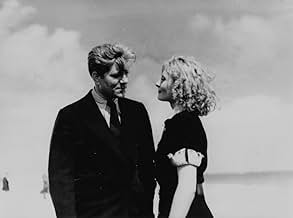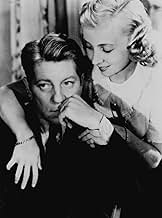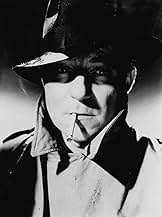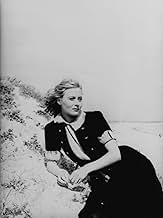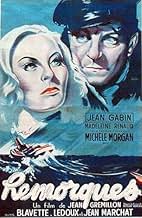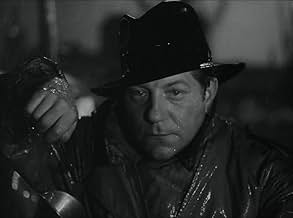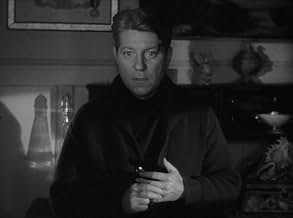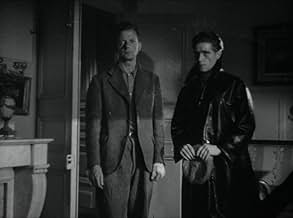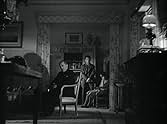Remorques
- 1941
- Tous publics
- 1h 31min
NOTE IMDb
7,2/10
1,7 k
MA NOTE
André Laurent, le capitaine d'un remorqueur, a épousé Yvonne il y a dix ans. Elle a une maladie cardiaque mais ne veut pas lui dire. Elle rêve qu'il quitte le travail pour qu'ils puissent vi... Tout lireAndré Laurent, le capitaine d'un remorqueur, a épousé Yvonne il y a dix ans. Elle a une maladie cardiaque mais ne veut pas lui dire. Elle rêve qu'il quitte le travail pour qu'ils puissent vivre tranquillement.André Laurent, le capitaine d'un remorqueur, a épousé Yvonne il y a dix ans. Elle a une maladie cardiaque mais ne veut pas lui dire. Elle rêve qu'il quitte le travail pour qu'ils puissent vivre tranquillement.
- Réalisation
- Scénario
- Casting principal
Madeleine Renaud
- Yvonne Laurent
- (as Madeleine Renaud de la Comédie Francaise)
Charles Blavette
- Gabriel Tanguy
- (as Blavette)
Jean Dasté
- Le radio
- (as Jean Daste)
René Bergeron
- Georges
- (as Bergeron)
Henri Poupon
- Le docteur Maulette
- (as Poupon)
Marcel Pérès
- Le Meur
- (as Perez)
Marcel Duhamel
- Pierre Poubennec
- (as Duhamel)
Henri Pons
- Roger
- (as Pons)
Léonce Corne
- Un invité à la noce
- (non crédité)
Lucien Coëdel
- Un marin du 'Cyclope'
- (non crédité)
Henri Crémieux
- L'administrateur
- (non crédité)
Avis à la une
... from screenwriter Jacques Prevert and director Jean Gremillon. Jean Gabin stars as Andre Laurent, a rescue tugboat captain living and working in a stormy seaside village. He's 10 years married to the pleasant Yvonne (Madeleine Renaud), but he's become a bit bored and complacent with their union. On his latest rescue outing, his crew brings aboard a woman from a stranded ship. Her name is Catherine (Michele Morgan), and she's very unhappy in her marriage with the other ship's captain, a sleazy crook that she has grown to detest. Despite their better judgement, Andre and Catherine begin seeing each other.
Gabin is my favorite actor in French cinema, and this film is another example of why, as he deftly assays his role with a naturalism and honesty that eschews big showy moments but still ably projects the necessary emotion for the scene. Renaud is also good as the fragile wife, and Morgan is outstanding as the woman trapped in terrible circumstances. Director Gremillon shots a number of scenes in a visually striking manner, although the excessive use of obvious miniatures in the ships-at-stormy-seas scenes takes one out of the action a bit. Still, for a film shot over a period of three years due to a world war interrupting things, it's remarkable they accomplished what they did. Recommended.
Gabin is my favorite actor in French cinema, and this film is another example of why, as he deftly assays his role with a naturalism and honesty that eschews big showy moments but still ably projects the necessary emotion for the scene. Renaud is also good as the fragile wife, and Morgan is outstanding as the woman trapped in terrible circumstances. Director Gremillon shots a number of scenes in a visually striking manner, although the excessive use of obvious miniatures in the ships-at-stormy-seas scenes takes one out of the action a bit. Still, for a film shot over a period of three years due to a world war interrupting things, it's remarkable they accomplished what they did. Recommended.
There are films whose production could be a good subject for a film script. One of these cases seems to me to be 'Remorques' (the English distribution title was 'Stormy Waters'). The director of this film was Jean Grémillon, a very interesting filmmaker, a documentarist and a musician as well, an artist involved in the anti-Nazi resistance but also the author of several films produced and distributed during the occupation. These films could be the subject of a case study on the art of cinema under conditions of occupation and war, on the boundaries between dignity and collaboration under conditions of censorship. 'Remorques' is one of them. Filming began in the summer of 1939 and was interrupted by the outbreak of war, when Jean Gabin and other members of the film crew were called up in the army. Continuing in 1940, filming was interrupted again with the fall of Paris, to be completed in 1941. The film was first distributed in occupied France, with the approval of German censorship, although its stars, Jean Gabin and Michèle Morgan had meanwhile taken refuge in America. The international premiere did not take place until after the war, in 1946. Beyond this interesting history, 'Remorques' is a film with many qualities that make it stand the test of time and remain relevant over 80 years after its production.
The screenplay written by André Cayatte and Jacques Prévert, who adapted a novel by Roger Vercel for the screen, offers us a story that takes place on the ocean and on the shores of the (Atlantic) ocean which plays an important role. André Laurent, the film's main hero, is the captain of a tugboat which rescues and tows boats in distress during storms on the ocean. In such a situation, he meets Catherine, the wife of the captain of another ship, who decides to leave her husband. The romance that develops between André and Catherine endangers André's career as a seafarer dedicated to saving others and the marriage to his faithful wife Yvonne.
The romantic story is quite banal, but the film is interesting because of the way it is conceived visually and, of course, by the presence of two of the most formidable French actors of that period. Jean Gabin and Michèle Morgan had already worked together in Marcel Carné's 'Le quai des brumes' and the producers bet correctly by casting the two actors in the main roles. It is fascinating to this day to watch the way close-ups are used to make the characters' feelings cross the screen and the magnetism between them in the scenes where they are together. Jean Grémillon was a very interesting filmmaker, with experience in documentary films. Some of the scenes are shot on real boats and they convey authenticity and drama. The original intention was for most of the filming to take place at sea, but for various reasons, some of the action scenes had to be produced in the studio with miniature models. Too bad. On the other side we can admire the use of mobile cameras in the scenes on the beach or in the city of Brest. Here Grémillon anticipates techniques that would become basic instruments in the toolkits of New Wave directors two decades later. 'Remorques' is a film that bears the mark of the period in which it was made, but which manages to boldly combine cinematic genres. Although made in difficult conditions, it is solid and interesting enough to still be worth watching today.
The screenplay written by André Cayatte and Jacques Prévert, who adapted a novel by Roger Vercel for the screen, offers us a story that takes place on the ocean and on the shores of the (Atlantic) ocean which plays an important role. André Laurent, the film's main hero, is the captain of a tugboat which rescues and tows boats in distress during storms on the ocean. In such a situation, he meets Catherine, the wife of the captain of another ship, who decides to leave her husband. The romance that develops between André and Catherine endangers André's career as a seafarer dedicated to saving others and the marriage to his faithful wife Yvonne.
The romantic story is quite banal, but the film is interesting because of the way it is conceived visually and, of course, by the presence of two of the most formidable French actors of that period. Jean Gabin and Michèle Morgan had already worked together in Marcel Carné's 'Le quai des brumes' and the producers bet correctly by casting the two actors in the main roles. It is fascinating to this day to watch the way close-ups are used to make the characters' feelings cross the screen and the magnetism between them in the scenes where they are together. Jean Grémillon was a very interesting filmmaker, with experience in documentary films. Some of the scenes are shot on real boats and they convey authenticity and drama. The original intention was for most of the filming to take place at sea, but for various reasons, some of the action scenes had to be produced in the studio with miniature models. Too bad. On the other side we can admire the use of mobile cameras in the scenes on the beach or in the city of Brest. Here Grémillon anticipates techniques that would become basic instruments in the toolkits of New Wave directors two decades later. 'Remorques' is a film that bears the mark of the period in which it was made, but which manages to boldly combine cinematic genres. Although made in difficult conditions, it is solid and interesting enough to still be worth watching today.
No denying the magnificent, moody visuals are done with mastery. Gabin and Morgan are commanding in their roles as always. Supporting cast similarly excellent. Makes it clear from the beginning that it's a moody film, unlikely to end in the bright light of castles. And carries through that tone with grace. Human emotions often cause melodrama and tragedy. Sometimes, all we can do is carry on with what we know best. We had a nice detour; we make our decisions in life, though, and sometimes that's that. It was fun to live in fantasy for a while, but real life snapped us back and it's back to the grind. Poetic realism defined.
Title: An always vexing choice, "Stormy Waters" is the altered title chosen, rather than the original French "Remorques", which refers to the boat tuggers or trailers used for sea rescues, such as protagonist Captain André's "Cyclone".
Title: An always vexing choice, "Stormy Waters" is the altered title chosen, rather than the original French "Remorques", which refers to the boat tuggers or trailers used for sea rescues, such as protagonist Captain André's "Cyclone".
Jean Gabin stars as the captain of a tugboat. On a job, he rescues Michele Morgan. Later, they begin a romance, though Gabin is married to the lovable but perpetually worried Madeleine Renaud. This is a pretty good film, though it has some major flaws. The scenes in the stormy seas (which is what the title literally means) look particularly great for the time. The major flaw, as I see it, is that the relationship between Morgan and Gabin just happens too quickly, and is thus not that believable. In the scenes between Gabin and Renaud, their relationship seems so wonderful and loving that it's hard to believe he'd dump her so quickly - like later the same day, pretty much. The film's finale is quite powerful. The performances throughout are excellent, especially Gabin's. Jacques Prevert co-wrote the script.
The making of "Remorques" began in 1939,as a follow-up to the excellent "l'étrange Monsieur Victor",and because of the Occupation,was released two years later.That also explains the length of the movie (hardly 80 minutes in the broadcast versions).
It's a simple story:the plot involves a tough sailor,Gabin,torn between two women ,the frail Madeleine Renaud,Gremillon's favorite actress (she was featured in all of his four movies of the 1938-1943 period),and the disillusioned Michèle Morgan (with whom he had teamed up in Carné's famous "quai des brumes").
The banal plot matters much less than the atmosphere;the star of the movie is the Ocean:you can hear,feel or see it ceaselessly along the viewing.This ocean which nobody can tame,which breaks willpower.For man must work and woman must weep..
SPOILERS: The ending climaxes the movie.A distraught incredulous Gabin gazes at his dead wife whilst a lugubrious siren desperately wails there down by the ocean.Then the man,forgetting his plight,walks across the harbor to come to the rescue of the boat in distress:you can hear voices chanting prayers for the dead as he makes his way through darkness .This ending has the strength of an epic Victor Hugo poem.
It's a simple story:the plot involves a tough sailor,Gabin,torn between two women ,the frail Madeleine Renaud,Gremillon's favorite actress (she was featured in all of his four movies of the 1938-1943 period),and the disillusioned Michèle Morgan (with whom he had teamed up in Carné's famous "quai des brumes").
The banal plot matters much less than the atmosphere;the star of the movie is the Ocean:you can hear,feel or see it ceaselessly along the viewing.This ocean which nobody can tame,which breaks willpower.For man must work and woman must weep..
SPOILERS: The ending climaxes the movie.A distraught incredulous Gabin gazes at his dead wife whilst a lugubrious siren desperately wails there down by the ocean.Then the man,forgetting his plight,walks across the harbor to come to the rescue of the boat in distress:you can hear voices chanting prayers for the dead as he makes his way through darkness .This ending has the strength of an epic Victor Hugo poem.
Le saviez-vous
- AnecdotesThe film's production was heavily disrupted by the Second World War. Filming started in July 1939 but was interrupted on 3 September due to France declaring war on Germany, with director Jean Grémillon and lead actor Jean Gabin being mobilized. With a special permission granted, shooting resumed on 6 May 1940 but was interrupted again in June with the German army at the gates of Paris, leading producer Joseph Lucachevitch to flee to the USA while assistant director Louis Daquin and editor Marcel Cravenne took the film reels to the south of France, in Marseille and Pau. Filming resumed for the final time under German occupation in 1941, despite both lead actors Jean Gabin and Michèle Morgan having fled to the USA and concluded on 2 September, with some planned scenes having never been shot.
- ConnexionsEdited into Spisok korabley (2008)
Meilleurs choix
Connectez-vous pour évaluer et suivre la liste de favoris afin de recevoir des recommandations personnalisées
- How long is Stormy Waters?Alimenté par Alexa
Détails
- Date de sortie
- Pays d’origine
- Site officiel
- Langue
- Aussi connu sous le nom de
- Stormy Waters
- Lieux de tournage
- Sociétés de production
- Voir plus de crédits d'entreprise sur IMDbPro
- Durée1 heure 31 minutes
- Couleur
- Rapport de forme
- 1.37 : 1
Contribuer à cette page
Suggérer une modification ou ajouter du contenu manquant

Lacune principale
By what name was Remorques (1941) officially released in Canada in English?
Répondre
